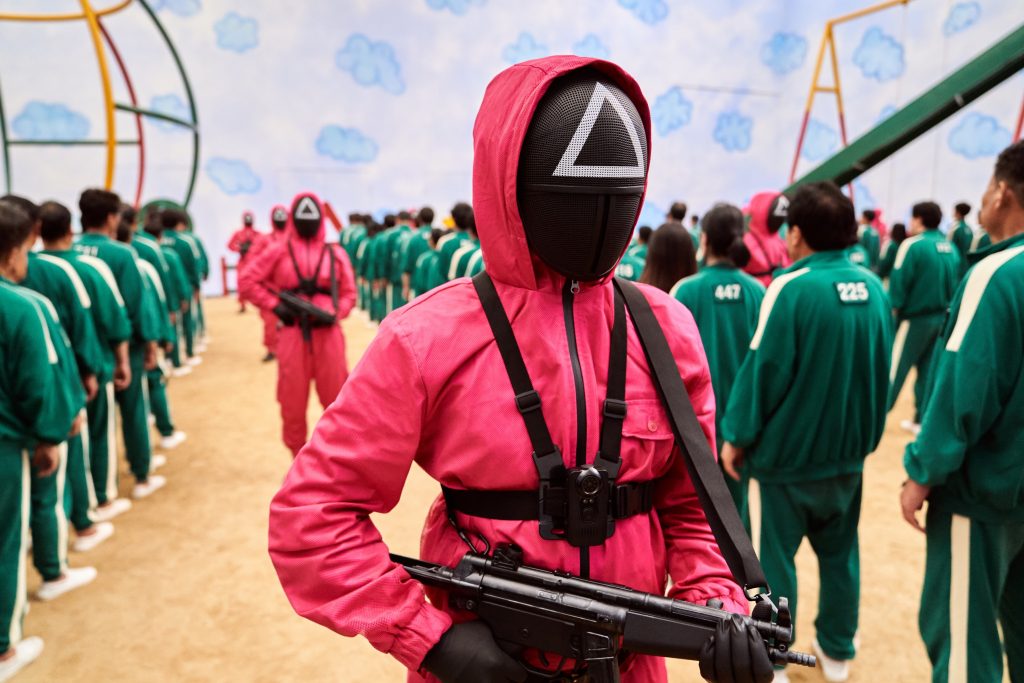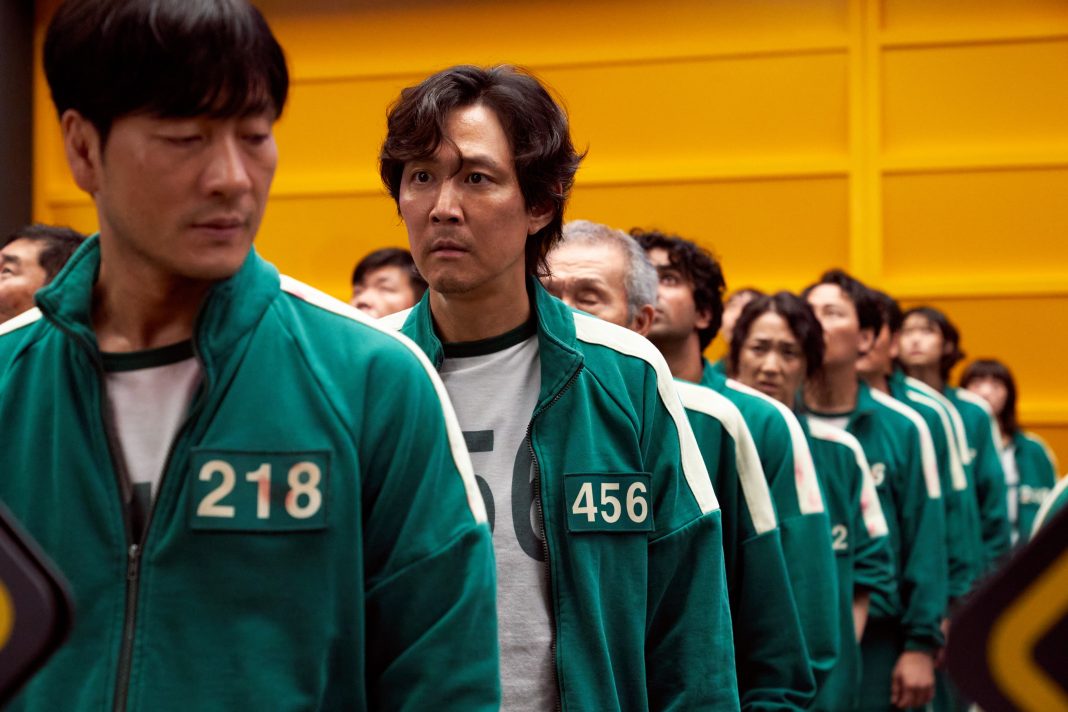If you haven’t yet heard of Squid Game chances are that pretty soon you will.
The Korean series is currently Netflix’s most-watched show in over 90 countries, with the streamer recently announcing that it is on track to become its most popular series of all time. Ahem! Move over, Bridgerton.
Sporting the tagline ‘45.6 Billion Is Child’s Play’ the series follows a motley collection of 456 contestants plucked from the streets in South Korea and pitted against each other in a series of playground games. The lucky winner gets to take home 45.6 billion won. The losers don’t get to go home at all.
In an unhurried first episode (there are 9 in total) we learn more about a handful of protagonists. They are each in desperate financial straits, and the lure of 45.5 billion won is too much to pass up, even if it means potential death in one of the 7 games arenas.
With the individual game rooms set against a colorful and nostalgic backdrop of painted blue skies, fluffy cartoon clouds, and oversized playground equipment, the series invites both contestants and viewers to immerse themselves in the nostalgia of childhood games. However the rug is quickly pulled as, unlike their childhood counterparts, the losers are brutally gunned down when they fail at their task, leaving the remaining survivors to contemplate the next day’s game. Meanwhile, we watch as in a control room, the eliminated players’ numbers are removed from the game board. Will any of our favorite characters survive? What is the ultimate point of the game, and who is really pulling the strings? Squid Game is happy to keep us guessing, but also expertly subverts our expectations with each episode.

If you’re thinking Squid Game is yet another title cut from the same cloth as many Western ‘Escape the Room’ style movies (Cube, Saw, Escape Room, et al) know that this series offers more nuance than just the opportunity to slice and dice a cast of 456 actors. What unfolds over 9 tightly-paced and well crafted episodes is both a cutting indictment of capitalism and a commentary on human nature and society.
In fact if a likeness has to be made, then Squid Game shares more in common with Bong Joon-ho’s Oscar-winning film Parasite, a movie also set in modern Korea that sought to highlight class divisions by illustrating the lengths to which people will go when driven by desperation.
For instance, we quickly learn that our players aren’t as trapped as we might at first have thought. The opportunity to leave is there for those who wish to take that route. However with families to protect, criminal gangs who want them dead in the outside world, hospital bills to pay, and more, we begin to see what life is really like for those living in the margins of society. With the trappings of social protection, healthcare, and basic human dignity stripped away, these people gladly choose to play a series of barbaric games for the opportunity to ease their own or a loved one’s burden. The shackles binding them to this horrific game are, in essence, societal, and the illusion of choice is just that.
Notably, Squid Game writer and director Hwang Dong-hyuk initially developed the script back in 2008, at a time when he was suffering his own personal financial hardship. Born from Hwang’s reading of books such as Liar Game and Gambling Apocalypse: Kaiji;, the emerging storyline seemed “too grotesque and complex” at the time, however.
“I wanted to write a story that was an allegory or fable about modern capitalist society, something that depicts an extreme competition, somewhat like the extreme competition of life,” said Hwang.

Hwang eventually returned to Squid Game some years later, commenting on the series’ themes: “It’s a sad story. But the reason why I returned to the project is because the world nowadays has transformed to a place where these unbelievable survival stories are so fitting, and found that this is the time when people will find these stories intriguing.”
And then there is the striking primary-colored, kid-friendly art direction — a stark juxtaposition to the carnage we see unfolding in each episode. It too is a pointed commentary, says Hwang, who set out to examine human nature under the lens of the aforementioned “extreme competition” of life.
Hwang’s contestants revisiting the games of their youth is a fitting allegory to how we change from the primal play of childhood to adulthood reasoning and restraint. This idea is perhaps best embodied in the character of Oh Il-nam, an elderly man with an inoperable brain tumor, who expresses a deep desire to return to the games of his youth, and the elemental joy associated with competing — and winning — instead of patiently taking his turn in the outside world to die alone. While the other contestants are fighting deep stress against the clock, Oh Il-nam is, for the most part, living his best life inside the arena.
Despite the depressing nature of the material, and key scenes of sudden graphic violence, Squid Game is not without notes of hope, although they are few and sometimes far between. Key characters struggle, but for the most part succeed in holding on to their humanity and their sense of hope when all seems lost.
Perhaps what will offer the biggest draw to viewers of Netflix’s breakout hit are its distinct visuals, a compelling storyline that never loses touch with the humanity of its characters, and a surprising number of clever twists (the show never seems to run out of new ideas) that prevent proceedings from falling into any kind of familiar formula. However it’s the subtle and thought-provoking commentary of what it means to be human in an ever evolving society that truly sets this series apart from its peers.
Squid Game is streaming on Netflix now.




